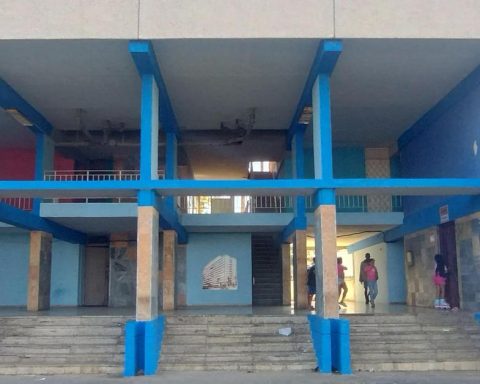Officials of the national government reaffirmed this Monday that the agreement with the International Monetary Fund (IMF) will not entail any labor or social security adjustment, and they also assured that spending on capital used to improve the country’s productive capacity will be increased by 60% this year.
The Minister of Productive Development, Matías Kulfas, He pointed out that the agreement with the Fund allows the path of fiscal balance to be “virtuously” since it does not include any of the “classic neoliberal reforms” and, at the same time, offers predictability and financial relief in the coming years.
“There are at least three elements that make a difference with the past and debunk the idea of adjustment and infeasibility. To begin with, this is an agreement that does not include any of the classic neoliberal reforms, there is no labor reform, nor pension reform , or request that we lower the pension for retirees,” Kulfas remarked in statements made this morning to AM750 and FutuRöck radio stations.
While, the Secretary for International Economic Relations of the Foreign Ministry, Cecilia Todesca Bocco, argued that the understanding with the Fund was a “necessary condition to move forward with the production and employment agenda”, and assured that it will allow “ordering” the exchange market along with inflation.
“The agreement was a necessary condition to move forward with the substantive issues that we have to work on and where we have put all our energy: the agenda of production, work, export; of science and technology,” the official told Radio 10.

For its part, the president of the Central Bank (BCRA), Miguel Pesce, He affirmed that the agreement will allow an increase in capital spending during this year, and he assured that the retirement formula will be applied in accordance with what is established by law.
“The important fact (linked to the fiscal issue) is that capital spending is going to increase this year by 60% and the retirement formula will be applied as established by law,” said the official in statements made today in dialogue with El Uncover Radio.
On the issue of collection, the head of the AFIP, Mercedes Marcó del Pont, said that the agency will strengthen the work in the field of supervision and control of the sectors with greater taxpaying capacity, with more tools for the control of grain marketing, over and under-invoicing maneuvers and the use of satellite images.
“We have tools and technology to carry out better controls of large taxpayers. For that we continue to exploit the information received from different countries about assets of Argentines around the world”, he added.
To these voices was also added that of the Director for the Southern Cone before the IMF, Sergio Chodos, who reaffirmed that the goals set forth in the understanding are “affordable” and “fulfillable”.

“It is an absolutely obvious, legitimate, natural and evident concern about the revisions by the Monetary Fund, and where the work of signing something that does not know what is going to be fulfilled and that is within what one believes philosophically has greater relevance. is going to happen,” Chodos said this morning in dialogue with El Destape Radio.
At this point, he indicated that “when there are goals that are attainable and parameters of core objectives that are achievable, the possible margin for there to be a problem in a review is less.”
Meanwhile, in his statements this morning, andMinister Kulfas also stressed that the understanding with the IMF announced last Friday generates “financial relief” and gives “predictability in the coming years and the possibility of having a reasonable path”.
In addition, he stressed that “there is no spending adjustment” but “a path to reduce the fiscal deficit that perfectly allows growth.”
In fact, Kulfas stressed that, based on what was agreed with the IMF, a default was avoided that would have caused “the loss of financing from other international organizations, which would have further aggravated the problem of shortage of foreign currency that we are wanting reverse”.
In addition, Pesce was optimistic about the possibility of adding US$ 5,000 million to the reserves this year, according to what was agreed with the IMF authorities.
“We expect a growth in reserves for this year of US$ 5,000 million. We believe that imports and exports will increase, with a trade balance that will have a surplus similar to that of last year,” the official concluded.
According to Todeca Bocco, of not having mediated an agreement with the multilateral credit organization, “The turbulence in the foreign exchange market would have amplified and affected the real economy.”
However, and in line with statements made by President Alberto Fernández, Todesca Bocco pointed out that “no one can celebrate an agreement with the Monetary Fund.”
In reference to the voices that criticized the agreement, he commented that “the question is how here and now, in the conditions that we have to go through, we can give it some stability and lower the level of uncertainty so that there is investment, production and employment” .
“It seems to me that the criticism of some colleagues is worthwhile in the sense of remembering what the Fund has been and what it means,” added the official, who indicated that “the President in 2019 wrote that Argentina has long lived in a disguised default.
The scope of the agreement
The financing program that Argentina and the IMF of Extended Facilities face establishes for each disbursement a repayment period of 10 years, with a four and a half year grace period.
The commitments assumed will have technical reviews every three months, for two and a half years; and each of them -which will end in the second half of 2024- will be accompanied by a disbursement, which will be conditional on the approval of the review.
With each of these disbursements, the original debt of the loan assumed by the government of Mauricio Macri in 2018, for 44,000 million dollars, will be paid.
At the end of the grace period and until the 10 years are up, a scheme of “twelve equal and consecutive semi-annual installments” will begin, according to what Chodos indicated in the statements he made this morning.

















